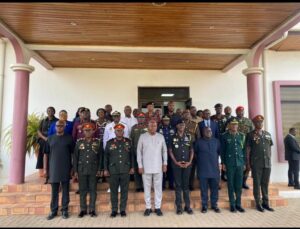President Mahama Meets National Security Heads Ahead of Bawku Visit to Address Long-Standing Conflict.
 In a decisive move to address the prolonged conflict in Bawku, former President John Dramani Mahama held a high-level meeting with the Heads of National Security Agencies on Tuesday morning. This strategic engagement forms part of his broader effort to restore peace and stability to the conflict-prone region, which has suffered significant loss of lives, destruction of property, and displacement of many residents over the years.
In a decisive move to address the prolonged conflict in Bawku, former President John Dramani Mahama held a high-level meeting with the Heads of National Security Agencies on Tuesday morning. This strategic engagement forms part of his broader effort to restore peace and stability to the conflict-prone region, which has suffered significant loss of lives, destruction of property, and displacement of many residents over the years.
The meeting precedes President Mahama’s much-anticipated visit to Bawku, where he plans to engage with local stakeholders and outline actionable steps to resolve the protracted dispute. During his campaign, he made a firm commitment to prioritizing the resolution of the Bawku conflict, recognizing its devastating impact on both the community and the nation at large.
President Mahama’s engagement with the National Security Heads underscores his proactive approach to tackling the issue. By consulting with key security stakeholders, he is equipping himself with critical insights to develop an informed and comprehensive strategy for resolving the conflict. This move aligns with his broader vision of fostering peace, security, and national unity as foundational pillars for Ghana’s development.
“Without peace, there can be no meaningful progress. The Bawku conflict has disrupted lives for far too long, and my administration is determined to end this cycle of violence,” President Mahama remarked in a recent address.
As President Mahama prepares to visit Bawku, expectations are high that his administration will unveil a detailed roadmap to address the root causes of the conflict. This roadmap is expected to combine short-term interventions with long-term solutions, including:
1. Dialogue with Stakeholders: Engaging traditional rulers, opinion leaders, youth groups, and other key players in open and constructive dialogue to foster mutual understanding and reconciliation.
2. Economic Empowerment Initiatives: Creating job opportunities and supporting small businesses to reduce poverty, which often exacerbates communal tensions.
3. Infrastructure Development: Investing in infrastructure projects such as schools, healthcare facilities, and roads to improve the living standards of residents and promote social cohesion.
4. Enhanced Security Measures: Collaborating with security agencies to maintain law and order while protecting the lives and properties of the people.
The people of Bawku, along with the entire nation, are eagerly anticipating President Mahama’s visit. Many see his commitment to resolving the conflict as a beacon of hope for a new era of peace and prosperity in the region.
Community leaders have expressed optimism about the visit, noting that a comprehensive plan backed by genuine political will could bring lasting peace to Bawku.
President Mahama’s efforts in Bawku reflect his broader vision for Ghana’s development. He has consistently emphasized that peace and stability are essential prerequisites for economic growth, social progress, and national unity.
The upcoming visit to Bawku is not just about resolving a local issue; it is a testament to President Mahama’s dedication to promoting harmony and inclusivity across the country. His administration’s success in tackling this long-standing conflict could set a precedent for addressing other security challenges in Ghana.
As President Mahama embarks on this critical journey, Ghanaians remain hopeful that his leadership will help usher in sustainable peace and development for Bawku and the nation as a whole.
